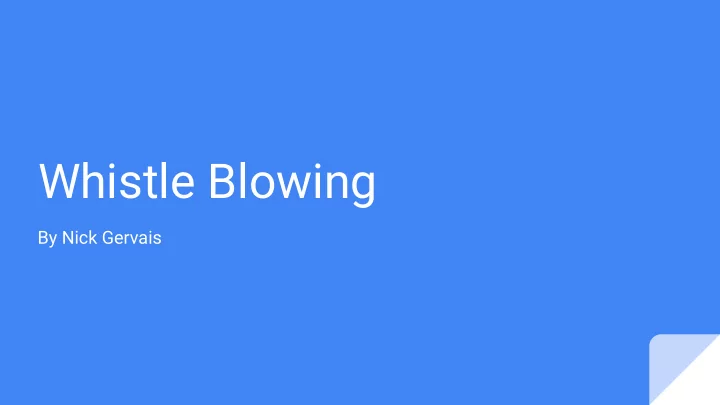

Whistle Blowing By Nick Gervais
Outline: ● What is a WhistleBlower? What are protective laws for them? ● Edward Snowden. ● ● Why this is important. ● Conclusion
Someone who goes against an What is a organization in order to make an unauthorized disclosure of Whistleblower? information about a harmful situation.
A Whistleblower’s 5 questions to ask. 1. Do you believe the problem may result in “serious and considerable harm to the public”? 2. Have you told your manager your concerns about the potential harm? 3. Have you tried every possible channel within the organization to resolve the problem? 4. Have you documented evidence that would persuade a neutral outsider that your view is correct? 5. Are you reasonably sure that if you do bring this matter to public attention, something can be done to prevent the anticipated harm?
Harmful Aspects of WhistleBlowing. ● Shows Disloyalty towards the company. Causes short and long term damage to the company. ● The manager is responsible for the decisions made. ●
Protective laws
False Claims Act ● Enacted by Congress in 1863. Help to prevent companies from submitting falsified claims to the ● government. ● Allowed whistleblower to sue the perpetrator on behalf of the government. ● Whistleblower would receive a portion of the settlement. Amended negatively in 1943, and positively in the mid 1980’s ●
Whistleblower Protection Act ● Passed by Congress in 1989 Covers federal employees only. (except CIA, FBI, NSA) ● Allows disclosure of misconduct and reportings of retaliation through the ● Office of Special Counsel. ● Whistleblower Protection Enhancement Act was passed in 2012.
Freedom of Information Act of 1966 ● Gives the Public the right to request access to records from any federal agency. Federal agencies must give requested information. ● ● Exempt if requested information leaks personal privacy, national security, and law enforcement.
Edward Snowden Hero or Traitor?
NSA’s response (Richard Ledgett) ● “He absolutely did have alternative ways that he could have gone” “Actions he took were inappropriate because of the fact that he put ● people’s lives at risk” ● “There’s also an amazing arrogance to the idea that he knows better than the framers of the Constitution” “People have legitimate concerns about the balance between transparency ● and secrecy.”
Kantianism Analysis First Formulation (Golden Rule): Snowden’s actions were not moral . ● People don’t want their classified information leaked. ● Second Formulation: Snowden’s actions were not moral . ● ● Deceived Booze Allen Hamilton with intentions to leak information.
Utilitarianism Analysis: Positives: ● World public benefited from knowing NSA’s surveillance on them. ● Snowden is pleased with his decision. Negatives: ● Hurt the US Military Troops vulnerable from the disclosures. ● Terrorists may have benefited from the information as well. ● All companies involved were negatively impacted. Outcome: ???
Why is this important to talk about?
Conclusion
Questions?
References https://www.ted.com/talks/richard_ledgett_the_nsa_responds_to_edward_snowden_s_ted_talk/trans cript#t-808071 https://www.ted.com/talks/edward_snowden_here_s_how_we_take_back_the_internet/transcript#t-3 94699 https://employment.findlaw.com/whistleblowers/whistleblower-protection-act-an-overview.html https://en.wikipedia.org/wiki/Whistleblower_protection_in_the_United_States https://en.wikipedia.org/wiki/Edward_Snowden Quinn, Michael Jay. Ethics for the Information Age . Pearson, 2017.
Recommend
More recommend